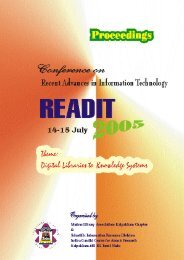READIT - 2009 - Indira Gandhi Centre for Atomic Research
READIT - 2009 - Indira Gandhi Centre for Atomic Research
READIT - 2009 - Indira Gandhi Centre for Atomic Research
Create successful ePaper yourself
Turn your PDF publications into a flip-book with our unique Google optimized e-Paper software.
Proceedings of <strong>READIT</strong>-<strong>2009</strong>, Kalpakkam - 603 102, 29-30 Dec <strong>2009</strong><br />
FEDERATED SEARCH: A SINGLE INTERFACE<br />
FOR MULTIPLE ACCESS<br />
N.Ashok Kumar<br />
Tamil Nadu Physical Education and Sports University<br />
Chennai – 600 006. E-mail: salaiashok@gmail.com<br />
ABSTRACT<br />
In general academic community is searching more number of articles on a research topic of their own in<br />
the Internet. Due to the In<strong>for</strong>mation explosion, identifying and locating a piece of in<strong>for</strong>mation in the Internet seems<br />
to be a difficult task. Though search engines are available to retrieve the in<strong>for</strong>mation from the Internet, its retrieving<br />
result is not upto the expected level, because, most of the search engines are Boolean operations based. Navigating<br />
and searching databases, full text articles, and abstract in a single interface is the need of the hour. The Federated<br />
Searching is a latest technique, which is being promoted by the vendors to have one stop access <strong>for</strong> databases,<br />
abstracts and full text articles in a single interface. This paper discuss about the concept of Federated Searching, its<br />
features, architecture, advantages and disadvantages, organizations developing federated searching engines and its<br />
future use in academic libraries.<br />
Key Words: Federated Search, Search Engines, Single-Interface, Search Tools.<br />
INTRODUCTION:<br />
In an academic environment quality research output is dependent on the research<br />
infrastructure provided and the researchers’ talent. As such researchers expect the appropriate<br />
knowledge source or material and the technical guidance from the institution with which they are<br />
attached to. Among these infrastructures providing the processed in<strong>for</strong>mation or knowledge is<br />
the duty of the academic libraries. Most of the libraries are doing it so, but searching and<br />
utilizing the concise knowledge to a researcher’s domain topic is found to be difficult. Even<br />
though the researchers show preference <strong>for</strong> using the search engines namely Google, Yahoo,<br />
AltaVista and other search engines to find in<strong>for</strong>mation. In real practice Google and other search<br />
engines retrieving results show that they list the contents, which has low impact <strong>for</strong> the<br />
researchers. Usually the search engines cannot index content inside databases, which are only<br />
accessible by filling out search <strong>for</strong>ms on web pages. The large amount of high-quality scientific,<br />
technical and business in<strong>for</strong>mation is available in the deep web, which was not accessible<br />
through the popular search engines.<br />
In this context <strong>for</strong> a researcher to expect to search 1,000 databases simultaneously <strong>for</strong><br />
critical in<strong>for</strong>mation is not unreasonable, while parallel searching is the domain of federated<br />
search. Thus the new tool emerging to overcome all the difficulties is the one stop interface<br />
called federated searching, which is the alternate solution. This paper discusses the concept of<br />
121<br />
1

















